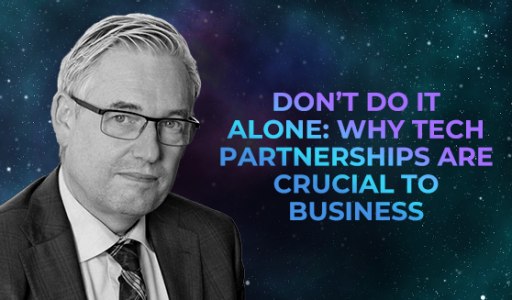
Is GenAI the key to building smarter cities?
Learn how generative AI is unlocking the true potential of digital twins – to make smart cities more efficient, inclusive, and citizen-focused.


“No matter how big you are you need to be fast, and you need to partner, and you need to grow very quickly otherwise someone else will overtake you.”
Felix Wass (CEO and President of DETASAD) left us in no doubt at #LEAP22 that tech partnerships are crucial to the future of innovation and business. For business leaders and startup founders, access to new technologies has heightened competition – because everyone has the potential to become an entrepreneur. But the solution to this isn’t to do it alone and try to beat everyone else; it’s to collaborate with strategic partners.
Competition is a hallmark of capitalism, and it’s essential to a healthy and fair market. As US President Biden tweeted in 2021, “Let me be clear: capitalism without competition isn’t capitalism. It’s exploitation.”
From a conventional point of view, the idea of collaborating with competitors in order to make it in the market could seem counter-intuitive, and even a little unsettling. But today’s reality is that the tech market is moving at super-speed. And no single company can stay ahead without joining forces with another. Not even Google.
According to Deloitte’s 2022 Technology Industry Outlook report, published this month, cloud tech and everything-as-a-service is accelerating rapidly through 2022 and beyond, and this will only increase access to tech (and by extension, increase competition) even more. Research from CompTIA shows that the tech industry will exceed USD $5.3 trillion in 2022, and cloud computing is expected to grow at a CAGR of 17.5% until 2025.
At LEAP, we really believe in the potential of tech to make life better, and improve humanity’s relationship with our environment. But Wass reminded us that the pace of development does have its downsides – and as human beings, we have to remain aware of technology’s limitations, and retain our control over tech to make sure there’s always humanity in the way it’s applied.
“Take COVID,” Wass said, “if a machine would decide on what COVID restrictions to implement, maybe all of us would be locked in an apartment for two years until the virus dies out. But there is no humanity, there is no emotion in this decision-making: it’s purely data-driven.”
As humans, we’re all struggling with other challenges rooted in tech. We’re dealing with the constant pull of the smartphones in our pockets: “if you have five minutes’ idle time, if you have one minute idle time, you have to go on WhatsApp, you have to go on a game, you have to check what’s happening in the world.”
We’re overloaded with information, constantly available to others via our digital devices, and that has its benefits – but it’s also a distraction from what’s really important. As Wass put it, “Are we really focusing on what’s necessary?”
Just because it’s possible to reply to a hundred emails each day doesn’t mean we should do that. For Wass, in order to develop future tech that really works for human beings, “what is required is emotional convictions – you need to believe in something, you need to be driven by something, and you need to act accordingly.”
As technological development continues to speed up, individuals need to find new ways to define their own boundaries with tech. And at the same time, businesses need to find new ways to integrate emotion and humanity into the products they create.
One of the key forces that’s driving incredibly fast tech development is convergence. Different technologies are increasing in power in their own right; but when you then put those technologies together, change accelerates exponentially.
Add AI and machine learning algorithms to computers with ever-increasing power capacity and their power is increased immensely. Add to that 3d printing, and nano tech…”You enter into a cycle where technology is self-accelerating,” Wass said. And then we see the invention of new tech that was inconceivable just a couple of years ago.
Because of digitisation and increased connectivity worldwide (as of April 2022 there were five billion internet users around the world), “the consequence of these trends of exponential growth of technology and of convergence of technology is [that] technology is available to everyone, everywhere. Any kid can come up with any kind of idea, which is great for technology innovation; but for business it’s also very challenging, because you invent something and the lead time you have to really implement it and monetise it becomes very limited.”
Today’s cloud model is a clear example of this. Anyone with the internet has access to immense computer power on a pay-as-you-go basis. Which means “a startup doesn’t need to have 100 million dollars to start inventing new AI models,” Wass pointed out.
In theory, anyone could do it. So competition is global: digitisation means that new tech startups aren’t just competing with others in their geographical region. It’s a worldwide market.
It’s why Google is going big on partnerships for cloud growth. In 2021, Google’s Cloud Platform (GCP) expanded its service provider partnerships to include Wipro, Infosys, Accenture, Atos, and more. Partnerships have become an essential strategy for tech company growth, and everyone’s doing it – from the giants that already control a lion’s share of the market; to smaller, innovative collaborations in niche segments of the tech industry. Like when Rothco (part of Accenture Interactive) partnered with Warner Music Group in 2021, to develop a machine learning algorithm that supports speech therapy for children via data-driven music.
Partnerships between companies are the only way to grow tech quickly enough to have a chance of success in today’s market. And partnerships are also a powerful opportunity to do something good: to add one idea to another in order to build something that makes a real difference.

Learn how generative AI is unlocking the true potential of digital twins – to make smart cities more efficient, inclusive, and citizen-focused.

The smart cities of the future will use tech to lower emissions, cut urban temperatures, and improve quality of life in highly populated areas.

Discover the cities that rank highly for smart city preparedness, and learn why locally relevant innovation is more important than cutting-edge tech.

Learn how generative AI is unlocking the true potential of digital twins – to make smart cities more efficient, inclusive, and citizen-focused.

The smart cities of the future will use tech to lower emissions, cut urban temperatures, and improve quality of life in highly populated areas.

Discover the cities that rank highly for smart city preparedness, and learn why locally relevant innovation is more important than cutting-edge tech.